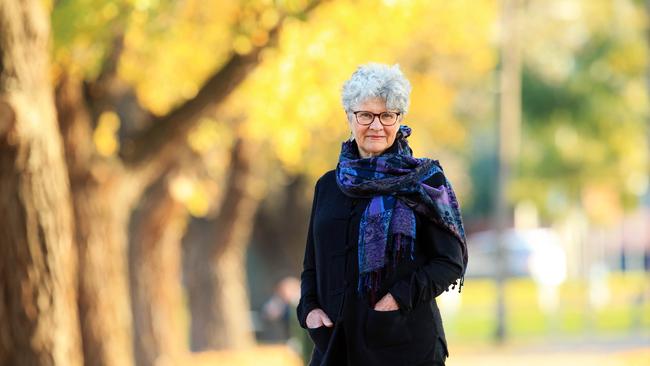Is Patrick White’s 1973 Nobel win Australia’s greatest achievement?
Nominated six times and winning the Nobel Prize in the era of Beckett, Tolkien, Golding, Miller and Wilder, Patrick White is widely considered our greatest ever writer. Can an Australian win again?

It was sixth time lucky for Patrick White. The novelist widely considered to be Australia’s greatest writer received the Nobel Prize in Literature 50 years ago this month after being nominated the previous five years.
Review can reveal that White was nominated in 1968, 1969, 1970, 1971 and 1972 before being named the laureate on October 18, 1973, with the Swedish Academy lauding “an epic and psychological narrative art which has introduced a new continent into literature”.
We do not know who White, then 61, beat in 1973. The Swedish Academy, which runs the prize, is stricter than the National Archives when it comes to cabinet papers, imposing a 50-year embargo on each year’s nominations.
Indeed the 1972 nominations have not yet been made public, but Review has obtained the full list and it is extraordinary to consider with whom the Sydney-based White was competing.
First, though, the winners. Japanese writer Yasunari Kawabata received the prize in 1968 after being nominated the previous seven years in succession. In 1969 it went to the Irish playwright Samuel Beckett; in 1970 to the Russian writer Aleksandr Solzhenitsyn; in 1971 to the Chilean poet Pablo Neruda; and in 1972 to German author Heinrich Boll, who finally received the nod on his 12th nomination.

The Russian writer Vladimir Nabokov, author of Lolita, who did not win the Nobel, was a contender from 1968-1971. The English novelist Graham Greene, also a non-recipient, was in the running each of the years White was nominated.
Other non-recipient writers nominated between 1968 and 1972 include the English poets W.H. Auden and Philip Larkin, former French president Charles de Gaulle (it’s worth noting Winston Churchill won the Nobel for literature, not peace), lord of the rings JRR Tolkien, lord of the flies William Golding, Japanese author Yukio Mishima, American playwrights Arthur Miller and Thornton Wilder, French writer/philosopher Simone de Beauvoir, Argentinian author Jorge Luis Borges, Catch-22 author Joseph Heller, Swedish children’s (and adult) writer Astrid Lindgren, American novelists James Baldwin, Norman Mailer and Philip Roth, and the list goes on.
What a dynamite list of writers to not win a prize founded by the inventor of that explosive stick. And yet the signs were there from the beginning. The inaugural Nobel in 1901 went to French poet Sully Prudhomme. Leo Tolstoy, who had War and Peace and a few other novels under his belt, was not nominated.
Some of White’s competitors between 1968-1972 did go on to win the Big One: American novelist Saul Bellow in 1976, South African writer Nadine Gordimer in 1991, German author Gunter Grass in 1999, Trinidadian-British writer VS Naipaul in 2001 and British novelist Doris Lessing in 2007. She was 88, making her the oldest recipient to date. The youngest was 41-year-old British writer Rudyard Kipling in 1907.
White, who died in 1990, aged 78, is the only Australian to win the Nobel Prize in Literature. Our adopted laureate, Adelaide-based JM Coetzee, was a South African citizen when he received the prize in 2003. He became an Australian citizen in 2006. Nor was White the first Australian to be nominated. The poet Judith Wright, his contemporary (1915-2000), was nominated in 1964, 1965 and 1967.
And while White was ambivalent about literary prizes, the Nobel was the one he wanted to win, as David Marr writes in his superb 1991 biography, Patrick White: A Life. “White had to guard himself,’’ Marr writes, “from the pain of being a contender who misses out.”
Part of this self-protection was to tell himself it would “only be humiliating” to have a prize that was not given to Tolstoy, Marcel Proust or James Joyce. As Marr writes, White was favoured to win in 1972, so much so that journalists camped outside the home he shared with Manoly Lascaris in Sydney’s Centennial Park. This goes to how he saw the Nobel as a double-edged sword: he worried about “the old spectre of destruction by fame if he should win”.
In the end, the Swedish Academy was divided in 1972 and the prize went to Boll. As Marr notes, it perhaps did not help White’s cause that he had described the German as a “dreary” writer. On receiving his commiseration letter, White said, “I no longer believe in the Nobel Prize. I think it should be discontinued and the money used to feed the hungry.”
Fortunately his advice was unheeded. Though when he did win the following year, he used part of the proceeds to establish the annual Patrick White Award, which is often seen as an exercise in feeding the hungry: underappreciated Australian writers.
The inaugural recipient, in 1974, was Christina Stead. Subsequent recipients include Sumner Locke Elliott, Randolph Stow, Bruce Dawe, Thea Astley and Elizabeth Harrower.
■ ■ ■
In recent years, the Nobel has ventured far and wide, going to writers such as Tanzania-born novelist Abdulrazak Gurnah in 2001, Polish writer and activist Olga Tokarczuk in 2018 and Belarusian journalist and historian Svetlana Alexievich in 2015.
In 1986, Nigerian playwright Woje Soyinka, who wrote on prison toilet paper while incarcerated for being politically incorrect, became the first laureate from sub-Saharan Africa.
Tom Keneally, surely an Australian contender, perhaps had Soyinka and others on his mind when asked if he thought we had a chance of a second win any time soon. “No way. Not enough of us are in jail. Put some of us in jail and we might have a chance.’’
When it comes to the international scorecard, France leads the pack with 16 Nobel laureates, the most recent being the 2022 recipient, the autobiographical novelist Annie Ernaux. The US and UK are tied in second place with 13 apiece.
Keneally, the first Australian to win the Booker Prize, for his 1982 novel Schindler’s Ark, is 86. Review mentions his age because the Nobel can only be awarded to a living writer. This perhaps helped Prudhomme in 1901, as both Oscar Wilde and Friedrich Nietzsche died in 1900.

There has been one exception to this must-be-alive rule and it caused controversy, not least because the posthumous recipient was Swedish: the poet Erik Axel Karlfeldt in 1931.
One has to feel for one of his rivals that year, the Spanish philologist and historian Ramon Menendez Pidal, who is the most-nominated non-recipient. Between 1931 and 1968, the first year White was nominated, Pidal received 154 nominations.
That number of nominations – 154 over 18 years for a prize that had been awarded 115 times between 1901 and 2022 – is a guide to how the process works.
The writers are nominated by academic and literary types who the Swedish Academy considers qualified enough to do so. In other words, you can’t be nominated by your mum, unless she’s a professor of English somewhere. And, in case anyone is thinking about it, you can’t nominate yourself.
In 1968 White received just one nomination, from Muriel Clara Bradbrook, professor of English at Cambridge University. In 1969 he received two, in 1970 five, including from a member of the Swedish Academy, in 1971 two, and in 1972 four. The 1973 nominations have yet to be made public.

As an aside, and as a huge fan of Graham Greene, a writer who pushed this writer across the bridge from children’s books to adult literature, it’s a little sad that he was there, yet again, in the 1972 nominations. Given he did not die until 1991, I prefer not to think about how many more years he waited in vain.
Aside from the inaugural recipient Prud’homme, nine writers have won it on their first nomination, including the American novelist William Faulkner, who in his acceptance speech said he believed “man will not merely endure: he will prevail”. Easy for him to think that! I say that in jest: his speech is passionate observation of the pains and joys of the writing life.
The nominations are considered by the four-to-five member Nobel Committee for Literature. The committee presents its recommendations, usually five of the nominated writers, to the 18-member Swedish Academy, which then decides the winner.
In its 1973 citation, the Swedish Academy made it clear the award was for White’s body of work, starting with the “masterly” The Aunt’s Story (1948), moving to “the book that really made his name” The Tree of Man (1955), then Voss (1957), Riders in the Chariot (1961), The Solid Mandala (1966), The Vivisector (1970) and The Eye of the Storm (1973).
“He is the one,’’ the citation concludes, “who, for the first time, has given the continent of Australia an authentic voice that carries across the world, at the same time as his achievement contributes to the development, both artistic and, as regards ideas, of contemporary literature.”
The presentation banquet took place in Stockholm on December 10, 1973, before the new (and still reigning) Swedish King Carl XVI Gustaf. The notable absentee was the winner. He sent his friend, the artist Sidney Nolan, to collect the prize on his behalf.
Nolan read out White’s acceptance speech, which was short enough to quote in full.
“Your Majesty, and gentlemen of the Swedish Academy, It is with great regret that I cannot revisit Stockholm on such an occasion as today. But to revisit and attend in thought will not be difficult, as one of the memories from travels in my youth is connected with the Town Hall of Stockholm. When I was 16 my parents and I travelled up from Malmö by train. Although this was many years ago and the visit only a brief one, there are still left in my memory the crossing of waters, walks along the quays of Stockholm, and the then new Town Hall. (Perhaps I shall also venture to add it was in Stockholm that I drank my first glass of wine.) Climatic conditions and my health permitting it is my wish to return once again, looking with a youth’s memories and an old man’s eyes on the city from which so large an honour has now been bestowed upon me.’’

As we mark the 50th anniversary of White’s historic win, the big question, Keneally’s jocularity aside, is whether Australia can win another Nobel Prize in Literature and, if so, who are the contenders.
Les Murray must have been a chance, but he died, aged 80, in 2019. Ditto Shirley Hazzard, who died in 2016, aged 85. Murnane, as mentioned, has been top of the speculative list in recent times including for the 2023 prize, which was awarded last week to Norwegian author Jon Fosse “for his innovative plays and prose which give voice to the unsayable”. There’s David Malouf, 89, Helen Garner, 80, Peter Carey, 80, who perhaps has the widest international readership, and Kate Grenville and Indigenous author Alexis Wright, both 72. Or the “young” guns such as Tim Winton and Richard Flanagan, each still under pension age.

The Australian’s chief literary critic, Geordie Williamson, thinks another winner is unlikely. Coetzee taking Australian citizenship, he argues, means this part of the world has been covered for a while, even if retrospectively. “The prize has always tended towards a parochial Eurocentrism,’’ he says, “and there is no reason to believe that will change any time soon.”
Fifty years is a long time and memories do fade. It’s worth remembering that in 2006 this newspaper sent a sample book chapter to 12 publishers and literary agents. The dozen deciders of what we read did not spot the anagram in the wannabe author’s name – Wraith Picket – or the fact they were in fact reading a slightly altered (character names were changed) chapter three of White’s novel The Eye of the Storm, published the year he won the Nobel. Ten of them said thanks but no thanks. Two did not respond at all.
With that in mind, let’s finish with White’s own thoughts, from a letter he wrote to the American film director Joseph Losey in 1981. Losey, director of seminal British films The Servant (1963) and Accident (1967), had agreed to adapt Voss, but for various reasons the film never came to be.
“As it is,’’ White wrote, “I’m a dated novelist, whom hardly anyone reads, or if they do, most of them don’t understand what I am on about.”
He ended with a little bittersweet alliterative joke. “Certainly I wish I had never written Voss, which is going to be everyone’s albatross.’’
Darren James








To join the conversation, please log in. Don't have an account? Register
Join the conversation, you are commenting as Logout